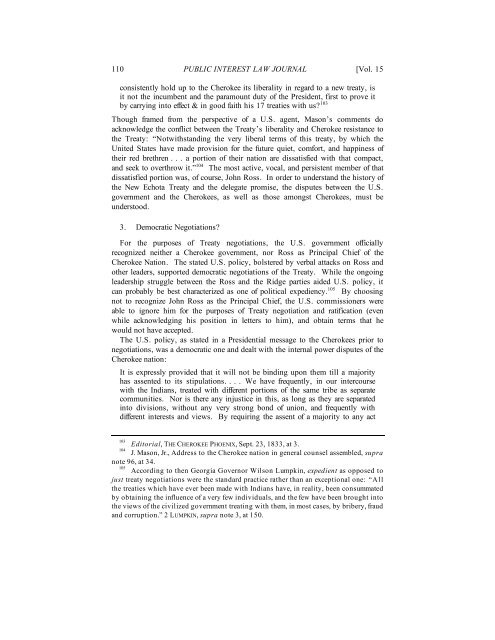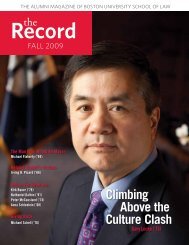the nature of representation: the cherokee right ... - Boston University
the nature of representation: the cherokee right ... - Boston University
the nature of representation: the cherokee right ... - Boston University
Create successful ePaper yourself
Turn your PDF publications into a flip-book with our unique Google optimized e-Paper software.
110 PUBLIC INTEREST LAW JOURNAL [Vol. 15<br />
consistently hold up to <strong>the</strong> Cherokee its liberality in regard to a new treaty, is<br />
it not <strong>the</strong> incumbent and <strong>the</strong> paramount duty <strong>of</strong> <strong>the</strong> President, first to prove it<br />
by carrying into effect & in good faith his 17 treaties with us? 103<br />
Though framed from <strong>the</strong> perspective <strong>of</strong> a U.S. agent, Mason’s comments do<br />
acknowledge <strong>the</strong> conflict between <strong>the</strong> Treaty’s liberality and Cherokee resistance to<br />
<strong>the</strong> Treaty: “Notwithstanding <strong>the</strong> very liberal terms <strong>of</strong> this treaty, by which <strong>the</strong><br />
United States have made provision for <strong>the</strong> future quiet, comfort, and happiness <strong>of</strong><br />
<strong>the</strong>ir red brethren . . . a portion <strong>of</strong> <strong>the</strong>ir nation are dissatisfied with that compact,<br />
andseektooverthrowit.” 104 The most active, vocal, and persistent member <strong>of</strong> that<br />
dissatisfied portion was, <strong>of</strong> course, John Ross. In order to understand <strong>the</strong> history <strong>of</strong><br />
<strong>the</strong> New Echota Treaty and <strong>the</strong> delegate promise, <strong>the</strong> disputes between <strong>the</strong> U.S.<br />
government and <strong>the</strong> Cherokees, as well as those amongst Cherokees, must be<br />
understood.<br />
3. Democratic Negotiations?<br />
For <strong>the</strong> purposes <strong>of</strong> Treaty negotiations, <strong>the</strong> U.S. government <strong>of</strong>ficially<br />
recognized nei<strong>the</strong>r a Cherokee government, nor Ross as Principal Chief <strong>of</strong> <strong>the</strong><br />
Cherokee Nation. The stated U.S. policy, bolstered by verbal attacks on Ross and<br />
o<strong>the</strong>r leaders, supported democratic negotiations <strong>of</strong> <strong>the</strong> Treaty. While <strong>the</strong> ongoing<br />
leadership struggle between <strong>the</strong> Ross and <strong>the</strong> Ridge parties aided U.S. policy, it<br />
can probably be best characterized as one <strong>of</strong> political expediency. 105 By choosing<br />
not to recognize John Ross as <strong>the</strong> Principal Chief, <strong>the</strong> U.S. commissioners were<br />
able to ignore him for <strong>the</strong> purposes <strong>of</strong> Treaty negotiation and ratification (even<br />
while acknowledging his position in letters to him), and obtain terms that he<br />
would not have accepted.<br />
The U.S. policy, as stated in a Presidential message to <strong>the</strong> Cherokees prior to<br />
negotiations, was a democratic one and dealt with <strong>the</strong> internal power disputes <strong>of</strong> <strong>the</strong><br />
Cherokee nation:<br />
It is expressly provided that it will not be binding upon <strong>the</strong>m till a majority<br />
has assented to its stipulations. . . . We have frequently, in our intercourse<br />
with <strong>the</strong> Indians, treated with different portions <strong>of</strong> <strong>the</strong> same tribe as separate<br />
communities. Nor is <strong>the</strong>re any injustice in this, as long as <strong>the</strong>y are separated<br />
into divisions, without any very strong bond <strong>of</strong> union, and frequently with<br />
different interests and views. By requiring <strong>the</strong> assent <strong>of</strong> a majority to any act<br />
103<br />
Editorial,THE CHEROKEE PHOENIX, Sept. 23, 1833, at 3.<br />
104<br />
J. Mason, Jr., Address to <strong>the</strong> Cherokee nation in generalcounsel assembled, supra<br />
note 96, at 34.<br />
105<br />
According to <strong>the</strong>n Georgia Governor Wilson Lumpkin, expedient as opposed to<br />
just treaty negotiations were <strong>the</strong> standard practice ra<strong>the</strong>r than an exceptional one: “All<br />
<strong>the</strong> treaties which have ever been made with Indians have, in reality, been consummated<br />
by obtaining <strong>the</strong> influence<strong>of</strong>a veryfew individuals, and <strong>the</strong>few have been brought into<br />
<strong>the</strong> views <strong>of</strong> <strong>the</strong> civilized government treating with <strong>the</strong>m, in most cases, by bribery, fraud<br />
and corruption.” 2 LUMPKIN, supra note 3, at 150.









